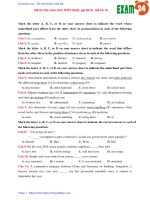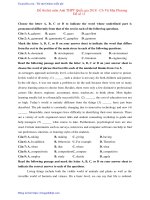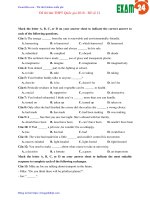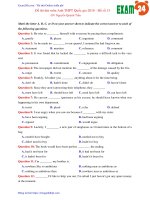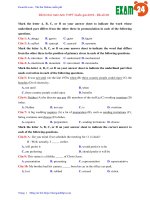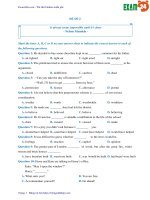- Trang chủ >>
- THPT Quốc Gia >>
- Ngoại Ngữ
GIẢI CHI TIẾT đề thi thử môn Anh THPT Quốc gia 2018 – Đề số 03
Bạn đang xem bản rút gọn của tài liệu. Xem và tải ngay bản đầy đủ của tài liệu tại đây (399.69 KB, 12 trang )
Đề thi thử môn Anh THPT Quốc gia 2018
Đề số 3
Mark the letter A, B, C, or D on your answer sheet to indicate the word whose underlined
part differs from the other three in pronunciation in each of the following questions.
Question 1:
A. formed
B. naked
C. recorded
D. trusted
Question 2:
A. busy
B. answer
C. person
D. basic
Mark the letter A, B, C, or D on your answer sheet to indicate the word whose stress
differs from the other three in pronunciation in each of the following questions.
Question 1:
A. generation
B. situation
C. education
D. examination
Question 2:
A. approach
B. leftovers
C. supportive
D. biologist
Mark the letter A, B, C or D on your answer sheet to show the underlined part that
needs correction.
Question 5: The shopkeeper warned the boys don't learn their bicycles against his windows.
A. The
B. don't
C. their
D. against
Question 6: The people who they hadn't seen the weather forecast were caught unaware by
the hurricane.
A. The
B. they
C. were
D. unaware
Question 7: No longer satisfied with the emphasis of the Denishawn school, Martha has
moved to the staff of the Eastman school in 1925.
A. satisfied
B. emphasis
C. has
D. the staff of
Mark the letter A, B, C, or D on your answer sheet to indicate the correct answer to each
of the following questions.
Question 8: Ann's encouraging words gave me _________ to undertake the demanding task
once again.
A. a point
B. an incentive
C. a resolution
D. a target
Question 9: I don’t suppose there is anyone there, _________?
A. do I
B. isn't there
C. is there
Question 10: He wanted to know whose car I had borrowed _________
A. the last evening
Đăng tải bởi
B. last night
1
D. don't I
C. yesterday evening
D. the previous night
Question 11: Are you taking_________ this semester?
A. house economics
B. home economic
C. house economic
D. home economics
Question 12: We should participate in the movements_________ the natural environment.
A. organizing to conserve
B. organized to conserve
C. organized conserving
D. which organize to conserve
Question 13: He does not_________ his fellow-workers and there are often disagreements
between them.
A. get on with
B. put up with
C. go on with
D. take to
Question 14: My mother _________ the responsibility for running the household.
A. bears
B. runs
C. holds
D. takes
Question 15: Sarah and I _________ reserved the rooms in the same hotel. She was really
surprised to see me there.
A. intentionally
B. practically
C. coincidentally
D. deliberately
Question 16: Anna waved to us as a_________ that he saw us.
A. signal
B. scene
C. signature
D. scenery
Question 17: Not until Kentucky’s Mammoth Cave had been completely explored in
1972_________
A. when was its full extent realized
B. the realization of its full extent
C. was its full extent realized
D. that its full extent was realized
Question 18: Knocking on closed doors before entering can be a great way for children to
practice _________ behaviors.
A. respecting
B. respectful
C. respected
D. respective
Question 19: My sister and her husband _________ over to my house for dinner tomorrow
evening.
A. came
B. come
C. going to come
D. are coming
Mark the letter A, B, C, or D on your answer sheet to indicate the most suitable response
to complete each of the following exchanges.
Question 20: John: “Do you think that we should use public transportation to protect our
environment?”
- Laura: “________________.”
Đăng tải bởi
2
A. Of course not. You bet.
B. There is no doubt about it.
C. Well, that’s very surprising
D. Yes, it’s an absurd idea
Question 21: - Alice: “How about having a drive to the countryside this weekend?”
- Mary: “________________. ”
A. That’s a good idea
B. Not at all
C. No, thanks
D. Let’s go
Mark the letter A, B, C, or D on your answer sheet to indicate the word or phrase that is
CLOSEST in meaning to the underlined part in each of the following questions.
Question 22: The sales of drugs is controlled by law in most of countries
A. permitted
B. restricted
C. illegal
D. binding
Question 23: Gradually more children were sent to the class as their parents realized that the
young teacher was trying her best to help their poor kids.
A. Weakly
B. Progressively
C. Slowly
D. Firstly
Mark the letter A, B, C, or D on your answer sheet to indicate the word or phrase that is
OPPOSITE in meaning to the underlined part in each of the following questions.
Question 24: I can’t stand people who treat animals cruelly.
A. reasonably
B. gently
C. brutally
D. cleverly
Question 25: About 95 percent of all animals are invertebrates which can live anywhere,
but most, like the starfish and crabs, live in the ocean.
A. with ribs
B. without backbones C. without ribs
D. with backbones
Mark the letter A, B, C, or D on your answer sheet to indicate the sentence that is closest
in meaning to each of the following questions.
Question 26: When the unemployment rate is high, the crime rate is usually also high.
A. The higher the unemployment rate is, the higher the crime rate is.
B. The unemployment rate is as high as the crime rate.
C. The unemployment rate and the crime rate are both higher.
D. The high rate of unemployment depends on the high rate of crime.
Question 27: "It can't be Mike who leaked the document, it might be Tom." said our manager.
A. Our manager blamed Tom for having leaked the document instead of Mike.
B. Our manager showed his uncertainty about who leaked the document: Mike or Tom.
Đăng tải bởi
3
C. Our manager suspected Tom of having leaked the document, not Mike.
D. Our manager made it clear that Tom was the one who leaked the document, not Mike.
Question 28: Mr. Smith is very interested in our plan. I spoke to him on the phone last night.
A. Mr. Smith is very interested in our plan to whom I spoke on the phone last night.
B. Mr. Smith, who is very interested in our plan, I spoke to on the phone last night.
C. Mr. Smith, who I spoke on the phone last night, is very interested in our plan.
D. Mr. Smith, to whom I spoke on the phone last night, is very interested in our plan.
Mark the letter A, B, C, or D on your answer sheet to indicate the sentence that best
combines of each pair of sentences in the following questions.
Question 29: You’d better take the keys. It’s possible I’ll come home late.
A. You’d better take the keys as I possibly come home late.
B. I’ll probably come home late so that you’d better take the keys.
C. If I come home late, you’d better take the keys.
D. You’d better take the keys in case I come home late.
Question 30: The student next to me kept chewing gum. That bothered me a lot.
A. The student next to me kept chewing gum, which bothered me a lot.
B. The student next to me kept chewing gum, that bothered me a lot.
C. The student next to me kept chewing gum bothering me a lot.
D. The student next to me kept chewing gum bothered me a lot.
Read the passage and mark A, B, C, or D to indicate the correct answer to each of the
blanks.
In a small village in North Yorkshire, there is a big old farmhouse ______(31) three
families live together. Alice and George and their three children, Joe and Pam and their two
children, and Sue and her baby daughter. The adults divide up the work between them.
George does the cooking, Joe and Sue do almost the housework. Pam looks after the
shopping and ______(32) the repairs, and Alice takes care of the garden.
Alice, George and Sue go out to work. Joe works at home ______(33) computer
systems, and Pam, who is a painter, looks after the baby during the day. Two of the children
go to school in the village, but the three oldest ones go by bus to the secondary school in the
nearest town, ten miles away.
Đăng tải bởi
4
The three families get ______(34) well, and enjoy their way of life. There are a few
difficulties, of course. Their biggest worry at the moment is money- one of the cars needs
replacing, and the roof needs some expensive repairs. But this isn't too serious- the bank has
agreed to a loan, which they expect to be able to pay back in three years. And they all say
they would much rather go on living in their old farmhouse ______(35) move to a luxury flat
in a big city.
Question 31:
A. that
B. where
C. in where
D. which
Question 32:
A. does
B. makes
C. prepares
D. fulfils
Question 33:
A. designs
B. and design
C. designing
D. who designs
Question 34:
A. on
B. off
C. with
D. in
Question 35:
A. then
B. than
C. to
D. therefore
Read the following passage and mark the letter A, B, C or D on your answer sheet to
indicate the correct answer to each of the questions.
The Hindu cultural celebrates marriage as a pure and pristine rite enabling two
individuals start their journey of life together. It puts emphasis on the values of happiness,
harmony and growth and could be traced back from the Vedic times.
Months before the wedding ceremony, an engagement is held which is called
"mangni". The couple is blessed here with gifts, jewelry and clothes. Another important ritual
is the "mehendi" which is a paste made from the leaves of henna plant. It is the traditional art
of adorning the hands and the feet of the bride with mehendi and the name of the groom is
also hidden in the design.
On the day of marriage, the couple exchanges garlands as a gesture of acceptance of
one another and a pledge to respect one another as partners which is known as "jaimala". This
is followed by "kanyadaan", where the father of the bride places her hand in the groom's hand
requesting him to accept her as an equal partner.
Another ritual is the "havan" in which the couple invokes Agni, the god of Fire, to
witness their commitment to each other. Crushed sandalwood, herbs, sugar rice and oil are
offered to the ceremonial fire. The "gath bandhan" takes place where scarves of the bride and
groom are tied together symbolizing their eternal bonThis signifies their pledge before God to
love each other and remain loyal. The couple then takes four "mangal pheras" or walk around
the ceremonial fire, representing four goals in life: "Dharma", religious and moral duties;
"Artha", prosperity; "Kama" earthly pleasures; "Moksha", spiritual salvation.
Đăng tải bởi
5
The couple also takes seven steps together to begin their journey, called the
"saptapardi". Then the ritual of "sindoor" takes place where the groom applies a small dot of
vermilion, a red powder to the bride's forehead and welcomes her as his partner for life. This
signifies the completion of the marriage. The parents of the bride and the groom then give
their blessings, "ashirwad" to the newlywed couple as they touch the feet of their parents.
Question 36: What might be the most suitable title for this reading passage?
A. The Hindu culture
B. The Hindu religion
C. The Hindu wedding
D. The Hindu tradition
Question 37: What does the word magni stand for?
A. the wedding
B. the paste made from the leave of one another
C. the engagement
D. the gesture of acceptance of one another
Question 38: What do the Hindu people think about marriage?
A. It is entirely a spiritual traditional ritual allowing two individuals to live together.
B. It is a belief in the growth of a family newly formed by two individuals.
C. It is a wish of happiness and harmony to come to two individuals.
D. It is just a living-together announcement of two individuals.
Question 39: What can the word adorning be best replaced by?
A. decorating
B. painting
C. repairing
D. dying
Question 40: What can the word invokes be best replaced by?
A. tells
B. says
C. prays
D. talks
Question 41: Why does the couple exchange garlands?
A. to do a ritual
B. to show both their acceptance of and the swear to respect the partner.
C. to express their acceptance of one another and a wish of happiness.
D. to express their vow to respect each other for the whole life.
Question 42: When is the wedding ceremony completed?
A. When the parents of the bride and the groom give their blessings to the couple.
B. When the couple touches their parents' feet.
C. When the couple makes seven steps together.
D. When the groom applies a small dot of vermillion of the bride's forehead.
Đăng tải bởi
6
Read the following passage and mark the letter A, B, C or D on your answer sheet to
indicate the correct answer to each of the questions.
A Japanese construction company plans to create a huge independent city-state, akin
to the legendary Atlantis, in the middle of the Pacific Ocean. The city, dubbed “Marinnation”,
would have about one million inhabitants, two airports, and possibly even a space port.
Marinnation, if built, would be a separate country but could serve as a home for international
organisations such as the United Nations and the World Bank.
Aside from the many political and social problems that would have to be solved, the
engineering task envisaged is monumental. The initial stage requires the building of a circular
dam eighteen miles in diameter attached to the sea bed in a relatively shallow place in
international waters. Then, several hundred powerful pumps, operating for more than a year,
would suck out the sea water from within the dam. When empty and dry, the area would have
a city constructed on it. The actual land would be about 300 feet below the sea level.
According to designers, the hardest task from an engineering point of view would be to
ensure that the dam is leak proof and earthquake proof.
If all goes well, it is hoped that Marinnation could be ready for habitation at the end of
the second decade of the twenty-first century. Whether anyone would want to live in such an
isolated and artificial community, however, will remain an open question until that time.
Question 43: According to the text, Marrination, when built, will be a(an)__________ city.
A. underwater
B. underground
C. marine
D. legendary
Question 44: The word ‘akin’ in paragraph 1 could be best replaced by __________.
A. likely
B. close
C. next
D. similar
Question 45: Which of the following would NOT be a problem for the construction plan?
A. social
B. political
C. engineering
D. financial
Question 46: Which of the following is NOT true according to the text?
A. Marinnation would have about one million inhabitants.
B. Marinnation will be built in a deep place in the Pacific Ocean.
C. Marinnation will be located in the middle of the Pacific Ocean.
D. Marinnation could be served as home for international organisations.
Question 47: The word ‘monumental’ in Paragraph 2 means __________.
A. important and difficult
B. like a large monument
C. important and historic
D. serving as a monument
Đăng tải bởi
7
Question 48: The phrase ‘suck out’ in paragraph 2 is closest in meaning to which of the
following?
A. draw out
B. dry up
C. take out
D. pull out
Question 49: According to the text, people could come to live in the future city in the year
__________.
A. 2002
B. 2012
C. 2010
D. 2020
Question 50: What does the author imply in the last sentence of the passage?
A. People will ask an open question about living in Marinnation.
B. The construction of Marinnation could never be completed in time.
C. People might not want to live in an isolated and artificial community.
D. People will ask how they can live in such an isolated and artificial city.
Đáp án
1-A
2-A
3-D
4-A
5-B
6-B
7-C
8-B
9-C
10-D
11-D
12-B
13-A
14-D
15-C
16-A
17-C
18-B
19-D
20-B
21-A
22-D
23-B
24-C
25-B
26-A
27-C
28-D
29-D
30-A
31-B
32-B
33-C
34-A
35-B
36-C
37-C
38-A
39-A
40-C
41-B
42-D
43-C
44-D
45-D
46-B
47-A
48-A
49-D
50-C
LỜI GIẢI CHI TIẾT
Question 1: Đáp án A
– phát âm là /d/, những từ còn lại phát âm là /id/.
Question 2: Đáp án A
– phát âm là /z/, những từ còn lại phát âm là /s/.
Question 3: Đáp án D
– trọng âm rơi vào âm thứ 4, những từ còn lai rơi vào âm thứ 3.
Question 4: Đáp án A
– trọng âm rơi vào âm thứ 2, những từ còn lại rơi vào âm thứ nhất.
Question 5: Đáp án B
– warn somebody against something/doing something : cảnh báo ai không được làm gì.
Question 6: Đáp án B
Đăng tải bởi
8
– thừa chữ “they‟, đại từ quan hệ „who‟ thay thế cho chủ ngữ là người.
Question 7: Đáp án C
– “in 1925” => 1 sự kiện xảy ra và kết thúc trong quá khứ => thì quá khứ đơn.
Question 8: Đáp án B
– incentive (sự khích lệ) là hợp nghĩa nhất.
Question 9: Đáp án C
– Câu đầu có I + các động từ sau: think, believe, suppose, figure, assume, fancy, imagine,
reckon, expect, seem, feel that + mệnh đề phụ. Lấy mệnh đề phụ làm câu hỏi đuôi.
Question 10: Đáp án D
– câu tường thuật “last night‟ => “the previous night‟.
Question 11: Đáp án D
– home economics: Kinh tế gia đình là tên 1 môn học.
Question 12: Đáp án B
– movements organized to conserve (những động thái được tổ chức để bảo toàn …)
Question 13: Đáp án A
– get on with somebody : hòa hợp với ai đó.
Question 14: Đáp án D
– take the responsibility for : nhận trách nhiệm làm gì.
Question 15: Đáp án C
– coincidentally : một cách trùng hợp.
Question 16: Đáp án A
– signal : dấu hiệu.
Question 17: Đáp án C
– cấu trúc Not until + N/mệnh đề, mệnh đề đảo: không cho đến tận khi.
Question 18: Đáp án B
– respectful behavior: hành vi lễ phép.
Question 19: Đáp án D
– thì hiện tại tiếp diễn nói về hành động chắc chắn sẽ xảy ra trong tương lai gần.
Question 20: Đáp án B
– There is no doubt about it : Thể hiện sự đồng tình với ý kiến nào đó.
Question 21: Đáp án A
– That’s a good idea : Thể hiện sự đồng tình với ý kiến nào đó
Question 22: Đáp án D
Đăng tải bởi
9
– binding : ràng buộc, bắt buộc.
Question 23: Đáp án B
– Gradually = progressively : dần dần từ từ
Question 24: Đáp án C
– cruelly = brutally : một cách độc ác, tàn nhẫn
Question 25: Đáp án B
– invertebrate : không xương sống
Question 26: Đáp án A
– Khi tỉ lệ thất nghiệp cao, tỉ lệ tội phạm thường cũng cao. => Tỉ lệ thất nghiệp càng cao, tỉ lệ
tội phạm càng cao.
Question 27: Đáp án C
– “Không thể là Mike làm lộ tài liệu, mà có lẽ là Tom.” Quản lí của chúng tôi nói => Quản lí
của chúng tôi nghi ngờ Tom đã làm lộ tài liệu, không phải Mike.
Question 28: Đáp án D
– Ông Smith rất quan tâm đến kế hoạch của chúng ta. Tôi đã nói chuyện với ông ta trên điện
thoại tối hôm qua. => Ông Smith, người mà tôi nói chuyện trên điện thoại hôm qua, rất quan
tâm đến kế hoạch của chúng ta
Question 29: Đáp án D
– Bạn nên cầm chìa khóa theo. Có thể tối nay tôi sẽ về nhà muộn => Bạn nên cầm chìa khóa
theo trong trường hợp tôi về nhà muộn.
Question 30: Đáp án A
– Học sinh cạnh tôi cứ nhai kẹo cao su. Điều đó rất làm phiền tôi => Học sinh cạnh tôi cứ
nhai kẹo cao su, điều này làm tôi rất phiền
Question 31: Đáp án B
– đại từ where = giới từ + which thay thế cho chủ ngữ là địa điểm.
Question 32: Đáp án B
– make repair : sửa chữa đồ đạc.
Question 33: Đáp án C
– hai động từ nối liền nhau có dạng V + V-ing hoặc to V diễn tả 2 hoạt động bổ sung nghĩa
cho nhau.
Question 34: Đáp án A
– get on well : hòa hợp với nhau.
Question 35: Đáp án B
Đăng tải bởi
10
– would rather / than : thích cái gì hơn cái gì
Question 36: Đáp án C
– bài viết nói về một đám cưới Hindu
Question 37: Đáp án C
– magni: lễ đính hôn. – dòng thứ nhất đoạn thứ 2. “Months before the wedding ceremony, an
engagement is held which is called "mangni".”
Question 38: Đáp án A
– dòng thứ nhất, đoạn thứ nhất. “The Hindu cultural celebrates marriage as a pure and
pristine rite enabling two individuals start their journey of life together. It puts emphasis on
the values of happiness, harmony and growth and could be traced back from the Vedic
times.”
Question 39: Đáp án A
– adorn = decorate : trang điểm
Question 40: Đáp án C
– invoke = pray : cầu, khấn.
Question 41: Đáp án B
– dòng thứ nhất, đoạn thứ ba. “On the day of marriage, the couple exchanges garlands as a
gesture of acceptance of one another and a pledge to respect one another as partners which
is known as "jaimala".”
Question 42: Đáp án D
– dòng thứ nhất, đoạn cuối cùng. “Then the ritual of "sindoor" takes place where the groom
applies a small dot of vermilion, a red powder to the bride's forehead and welcomes her as
his partner for life. This signifies the completion of the marriage.”
Question 43: Đáp án C
– underwater city : thành phố dưới đáy biển. Dòng đầu tiên, đoạn thứ nhất. “A Japanese
construction company plans to create a huge independent city-state, akin to the legendary
Atlantis, in the middle of the Pacific Ocean.”
Question 44: Đáp án D
– akin = similar : gần giống.
Question 45: Đáp án D
– dòng thứ nhất đoạn thứ 2. “Aside from the many political and social problems that would
have to be solved, the engineering task envisaged is monumental.”
Question 46: Đáp án B
Đăng tải bởi
11
– dòng thứ 2, đoạn thứ 2. “The initial stage requires the building of a circular dam eighteen
miles in diameter attached to the sea bed in a relatively shallow place in international waters.”
Question 47: Đáp án A
– monumental : quan trọng, vĩ đại, xuất sắt, đầy thách thức.
Question 48: Đáp án A
– suck out = draw out : dẫn nước ra.
Question 49: Đáp án D
– dòng thứ nhất, đoạn thứ 3. “If all goes well, it is hoped that Marinnation could be ready for
habitation at the end of the second decade of the twenty-first century.”
Question 50: Đáp án C
– Tác giả đặt câu hỏi về việc liệu người ta có muốn sống trong một cộng đồng cách biệt và
nhân tạo như thế không.
Đăng tải bởi
12




